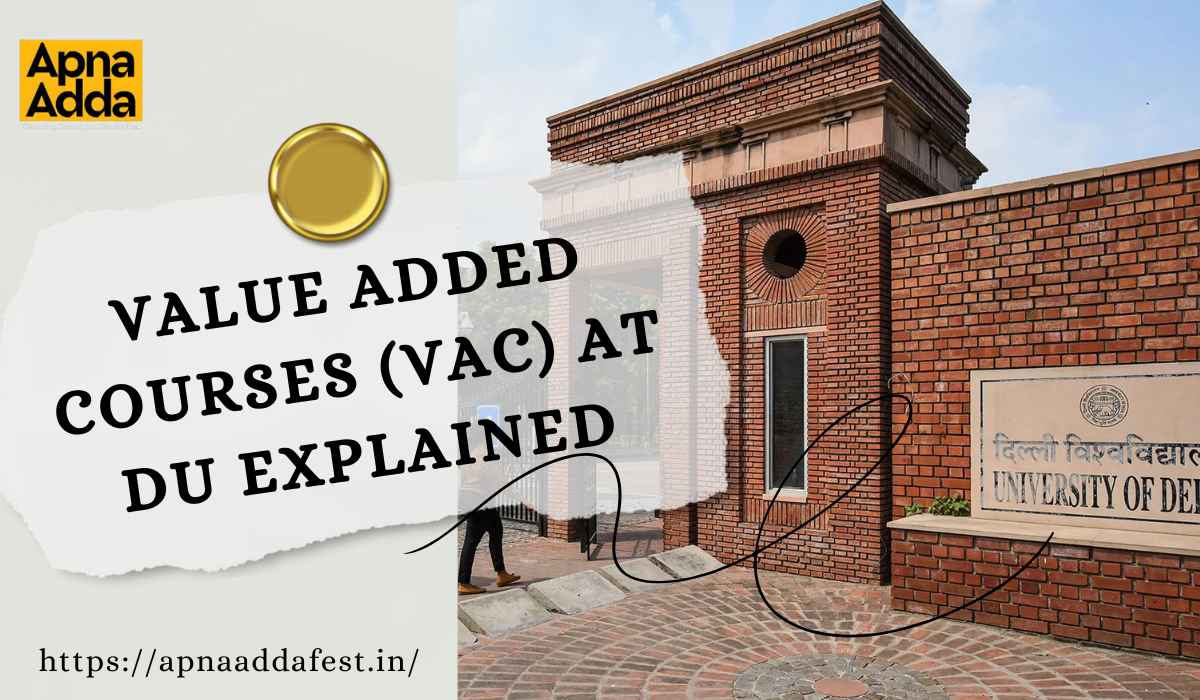Value Added Courses (VAC) at Delhi University Explained

The Value Added Courses (VAC) are designed to enhance students' skills in various areas that are not typically covered by traditional academic courses, such as foreign languages, photography, analytical skills, computer programming, and more. So come on, let's discuss it in detail!
Table Of Contents:
New Education Policy
The New Education Policy (NEP) was implemented in Delhi University from the academic year 2021-2022. This policy brought about significant changes in the education system, including curriculum revisions, structural reforms, and an emphasis on holistic development and flexibility in learning.
Multidisciplinary Approach - The curriculum was revised to promote a multidisciplinary approach, allowing students to choose courses across different disciplines. This encourages interdisciplinary learning and helps students develop a broader understanding of various subjects.
The NEP introduced flexibility in the curriculum, allowing students to choose courses based on their interests, career goals, and aptitude. This includes the option to select elective courses from different departments or pursue minors and majors in specific subjects.
Foundation Courses - The curriculum was revamped to include foundation courses that focus on building essential skills such as critical thinking, communication, and problem-solving. These courses lay the groundwork for students' academic and professional development.

Integration of Research and Experiential Learning - The NEP emphasizes the integration of research and experiential learning opportunities into the curriculum. This includes internships, projects, and fieldwork that allow students to apply theoretical knowledge in real-world settings and gain work experience.
Promotion of Indigenous Knowledge - The curriculum now includes a greater emphasis on indigenous knowledge systems, culture, and heritage. This helps students develop a deeper understanding and appreciation of India's rich cultural diversity and traditional knowledge.
Language Education - The NEP promotes multilingualism and encourages the use of mother tongues or local languages as the medium of instruction, particularly at the foundational level. This ensures that students have a strong foundation in their native language while also developing proficiency in other languages, including English.
Assessment Reforms - The assessment methods have been revised to focus more on continuous evaluation, project-based assessments, and skill demonstrations rather than traditional exams. It also lessens the burden of students, as the marks distribution is broken down in a very student-friendly manner.
Networking Opportunities - Students can gain valuable networking opportunities. They may have the chance to interact with professionals in their field of interest and build relationships that can benefit them in their academic and professional endeavors.
It can be provided by holding seminars, webinars, and lecture sessions for the students with eminent guests and speakers.
The changes in the curriculum reflect the goals of the New Education Policy, which include critical thinking and creativity and aligning education with the needs of the 21st century.
About VAC
VAC, as the name suggests, is intended to add extra value to a student's learning experience, making them more well-rounded and prepared for various professional challenges.
They are designed to be short-term courses that offer additional credits to students upon completion. Different departments or faculties within Delhi University offer a diverse range of VAC courses.

Credit Allocation & Assessment Structure
A student who pursues any undergraduate program at the university is offered a pool of Value Addition Courses, from which one has to choose one subject to study in each semester.
- Number of Subjects - The number of subjects included in VAC is 24 courses across different disciplines. These courses cover areas such as communication skills, computer literacy, foreign languages, entrepreneurship, environmental studies, and a lot more.
- Credit Allocation - The credit allocation for VAC courses is 2. The credit distribution of the course goes like this: 1 credit for practical and 1 credit for lecture. The courses—Fit India and Sports For Life—do not have theory exams.
The theory exam generally is of 30 marks, and the examination day is decided by the university. The practical exams are held before the commencement of theory exams as decided by the university.
- Assessment Structure - The assessment structure for VAC courses includes a combination of assignments, projects, presentations, tests, and written exams. The weightage of each component and the grading criteria are determined by the instructor or department offering the course.
Check Out The VAC Syllabus
How To Opt For VAC Courses
The students can opt for VAC courses, which are different from the field in which they are following under graduation. This lets one know more and broadens their knowledge about the scope of different subject matter.
One can also choose those subjects that interest them more and are different from the academic subjects, like yoga, mental health, diet, and nutrition. The students should be confident in what they are preferring, as each subject is equally good and enhances the learning process.
Benefits of VAC
- Enhanced Employability - VAC provides students with additional skills and knowledge that are valuable in the job market. By completing these courses, students can enhance their employability and stand out to potential employers.
- Diversified Skill Set - VAC covers a wide range of topics and skills, allowing students to diversify their skill set beyond their main academic discipline. This enables them to pursue interests outside of their major and develop a broader range of competencies.
- Practical Learning - Many VACs include practical components such as workshops and internships,ts providing students with real-world experience and application of theoretical knowledge. This practical learning enhances their understanding and prepares them for the challenges of the workforce.
- All-round Development - VAC often focuses on the development of students, addressing aspects such as communication skills, leadership abilities, critical thinking, and problem-solving. This comprehensive approach helps students develop into well-rounded individuals capable of succeeding in various professional and personal contexts.
- Personal Growth - Engaging in VAC allows students to explore new interests, challenge themselves, and step outside their comfort zones. This can contribute to personal growth and self-discovery, helping students develop confidence, resilience, and a sense of purpose.
Overall, value-added courses play a significant role in enriching the educational experience of students at Delhi University, equipping them with the skills, knowledge, and experiences needed to thrive in their academic and professional lives.
I propose a YouTube channel to whiz your VAC exams, which will help you cover your syllabus in just an hour or two.
Conclusion
VAC courses are specifically designed to accommodate students' time constraints and academic workloads. It's really a welcoming education program that eases the life of students.
VAC is truly beneficial and helpful for students as they grab them good marks and uplift their CGP; after all, we all need a soar in our marks.
Just select the subjectat you are comfortable with and enjoy that subject because it will definitely fetch you decent marks. Now I take my leave from you all and wish you all the best for your examinations.
For more interesting and exciting college updates, stay tuned to Apna Adda!

